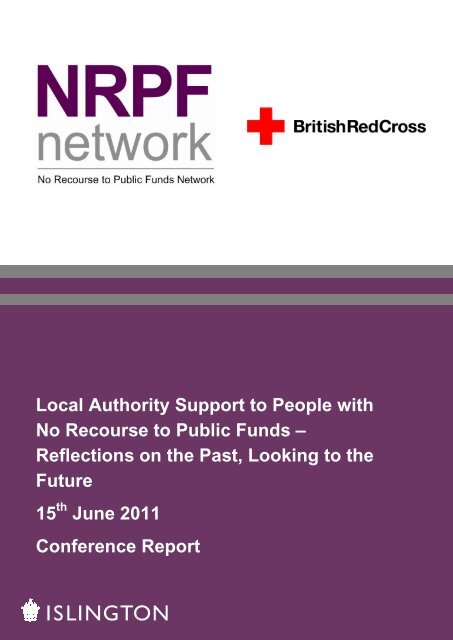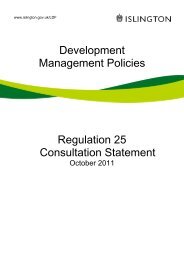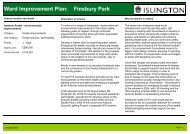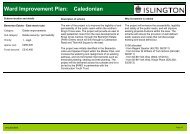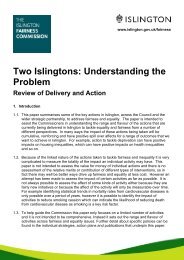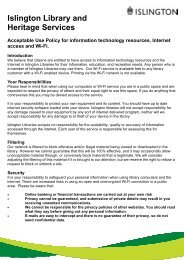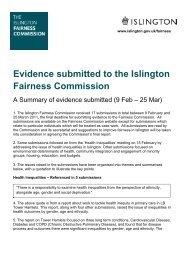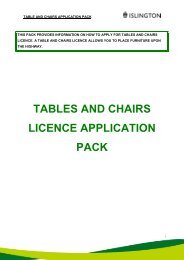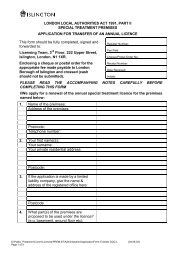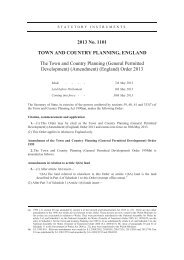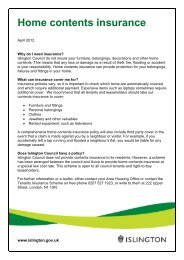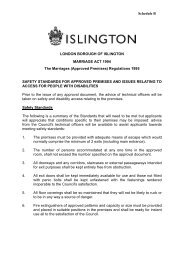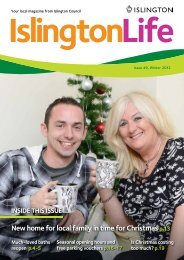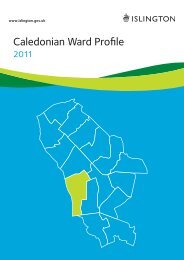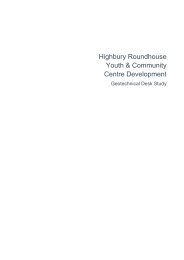Local Authority Support to People with No ... - Islington Council
Local Authority Support to People with No ... - Islington Council
Local Authority Support to People with No ... - Islington Council
Create successful ePaper yourself
Turn your PDF publications into a flip-book with our unique Google optimized e-Paper software.
<strong>Local</strong> <strong>Authority</strong> <strong>Support</strong> <strong>to</strong> <strong>People</strong> <strong>with</strong><br />
<strong>No</strong> Recourse <strong>to</strong> Public Funds –<br />
Reflections on the Past, Looking <strong>to</strong> the<br />
Future<br />
15 th June 2011<br />
Conference Report<br />
NRPF Network/British Red Cross Conference Report June 2011<br />
2
Contents<br />
Introduction 3<br />
Aims & Objectives of the Conference 3<br />
Key Issues 4<br />
Presentation Summaries 5<br />
Nick Scott-Flynn – Head of Refugee Services, British Red Cross 5<br />
Jonathan Price – Policy and Communications Officer, NPRF Network 5<br />
Hugo Tristram – Development Officer, Refugee Services, British Red Cross 6<br />
Hugh Ind – Regional Direc<strong>to</strong>r, London and South East, UKBA 7<br />
Sue Willman – Partner, Pierce Glynn Solici<strong>to</strong>rs 7<br />
Chris Spencer – Chair of ADCS/ADASS Asylum Taskforce 9<br />
Questions and Answers 10<br />
Workshops 11<br />
Adam Weiss, The AIRE Centre (Advice on Individual Rights in Europe) – A8<br />
Nationals and the End of the Interim Arrangements<br />
Jo Clarke, Eaves Housing – Sojourner Project and <strong>Support</strong> <strong>to</strong> Victims of Domestic<br />
Violence<br />
Henry St Clair Miller, NRPF Network/Isling<strong>to</strong>n <strong>Council</strong> – NRPF Connect 12<br />
Anca Andreopoulos, Refugee Action – Assisted Voluntary Return Programmes 13<br />
Participant Feedback 14<br />
NRPF Network/British Red Cross Conference Report June 2011<br />
2<br />
11<br />
11
Introduction<br />
The <strong>Local</strong> <strong>Authority</strong> <strong>Support</strong> <strong>to</strong> <strong>People</strong> <strong>with</strong> <strong>No</strong> Recourse <strong>to</strong> Public Funds – Reflections on the Past,<br />
Looking <strong>to</strong> the Future conference, held at the Assembly Hall, Isling<strong>to</strong>n on June 15 th 2011 was cohosted<br />
by the NRPF Network and the British Red Cross and addressed specific issues relating <strong>to</strong><br />
support for destitute people from abroad <strong>with</strong> no recourse <strong>to</strong> public funds (NRPF). This report<br />
summarises the presentations and workshops, and outlines the key issues that emerged during the<br />
conference.<br />
The purpose of the conference was <strong>to</strong> evaluate past successes and failures of support <strong>to</strong> people <strong>with</strong><br />
NRPF and look forward <strong>to</strong> what new challenges are facing the different sec<strong>to</strong>rs in regards <strong>to</strong> this<br />
support. This is <strong>with</strong> the intention of identifying emerging solutions <strong>to</strong> the current and future<br />
challenges in this area of work.<br />
The conference was attended by 123 delegates from a range of sec<strong>to</strong>rs and organisations: 42% from<br />
local authorities, 38% from the community and voluntary sec<strong>to</strong>r, 8% from NHS departments, 6% from<br />
<strong>Local</strong> Government representative bodies, 4% from central government and 2% from other agencies.<br />
Presentations were given by a panel of experts:<br />
� Nick Scott-Flynn, Head of Refugee Services, British Red Cross<br />
� Jonathan Price, Policy and Communications Officer, NPRF Network<br />
� Hugo Tristram, Development Officer, Refugee Services, British Red Cross<br />
� Hugh Ind, Regional Direc<strong>to</strong>r, London and South East, UKBA<br />
� Sue Willman, Partner, Pierce Glynn Solici<strong>to</strong>rs<br />
� Chris Spencer, Chair of ADCS/ADASS Asylum Taskforce<br />
Workshops were led by:<br />
� Adam Weiss, The AIRE Centre<br />
� Jo Clarke, Eaves Housing<br />
� Henry St Clair Miller, NRPF Network/Isling<strong>to</strong>n <strong>Council</strong><br />
� Anca Andreopoulos, Refugee Action<br />
Aims and Objectives of the Conference<br />
The event aimed <strong>to</strong>:<br />
� Bring <strong>to</strong>gether professionals working <strong>with</strong> NRPF individuals and families from local<br />
authorities, the voluntary sec<strong>to</strong>r, central government and other agencies <strong>to</strong> promote<br />
cooperation and understanding<br />
� Reflect on the developments in the support provided <strong>to</strong> people <strong>with</strong> NRPF in recent years<br />
� Identify new challenges facing local authorities and the voluntary sec<strong>to</strong>r in regards <strong>to</strong> support<br />
<strong>to</strong> NRPF individuals and families<br />
� Explore solutions <strong>to</strong> emerging issues<br />
� Increase awareness and understanding of policy and practice regarding support <strong>to</strong> people<br />
<strong>with</strong> NRPF<br />
NRPF Network/British Red Cross Conference Report June 2011 3
The objectives of the event were <strong>to</strong>:<br />
� Consider issues arising from the destitution of asylum seekers, refused asylum seekers and<br />
other migrant groups<br />
� Discuss the implications of changes in trends of support <strong>to</strong> the client group<br />
� Consider the impact of the Case Resolution Direc<strong>to</strong>rate (CRD)<br />
� Provide legal updates in the area of support <strong>to</strong> people <strong>with</strong> NRPF<br />
� Consider the impact of legal aid cuts and cuts in local authority funding on local authorities<br />
and the voluntary sec<strong>to</strong>r<br />
� Explore routes <strong>to</strong> providing support <strong>to</strong> EEA nationals<br />
� Provide information on the Sojourner Project for victims of domestic violence on spouse visas<br />
� Provide details of the process of voluntary return and what support is available <strong>to</strong> those<br />
embarking on the process of return <strong>to</strong> their country of origin<br />
� Discuss good practice in recording, moni<strong>to</strong>ring and reviewing local authority-supported NRPF<br />
cases, developing policies and procedures in dealing <strong>with</strong> cases <strong>to</strong> ensure an efficient start<strong>to</strong>-end<br />
process and working in partnership <strong>with</strong> other organisations <strong>to</strong> facilitate the resolution<br />
of NRPF cases<br />
� Look at the future management of NRPF cases <strong>with</strong> the aims of ensuring safeguarding,<br />
accountability and secure sharing of data and information<br />
Key Issues<br />
Key issues highlighted at the event included:<br />
- <strong>Local</strong> authority duties <strong>to</strong> people <strong>with</strong> NRPF are complex and require effective communication<br />
between local authorities, the UKBA and the voluntary sec<strong>to</strong>r. There needs <strong>to</strong> be sharing of<br />
policies and good practice between local authorities <strong>to</strong> facilitate the consistency of approach<br />
across the UK. NRPF Connect (more information below) will be a mechanism <strong>to</strong> facilitate<br />
communication between local authorities and the UKBA in order <strong>to</strong> help resolve cases and<br />
manage NRPF cases securely and effectively.<br />
- It is common that individuals and families <strong>with</strong> NRPF wait <strong>to</strong>o long for decisions on<br />
immigration applications <strong>to</strong> the UKBA. Furthermore, if a negative decision is made, return <strong>to</strong><br />
country of origin rarely takes place. As a result of this process, people are left in limbo and<br />
face destitution. <strong>Local</strong> authorities and the voluntary sec<strong>to</strong>r in some circumstances are<br />
required <strong>to</strong> fund support <strong>to</strong> those who are destitute. More financial support and a greater<br />
strategic approach <strong>to</strong> sustainable returns including removal of cases where all rights are<br />
exhausted and continued investment in voluntary returns is needed.<br />
- There are concerns regarding the future of provision of legal aid, and cuts in local authority<br />
funding for voluntary and community services<br />
- The landscape of NRPF has shifted hugely over the years. There have been important<br />
changes in case law and government policies, which have resulted in a shift from support <strong>to</strong><br />
adults <strong>to</strong> support provided by local authorities <strong>to</strong> children & families.<br />
- The UKBA must see local authorities as a stakeholder and should prioritise local authoritysupported<br />
cases in the same way as those on asylum support so that they do not get left in<br />
limbo.<br />
NRPF Network/British Red Cross Conference Report June 2011 4
Presentation Summaries<br />
Nick Scott-Flynn – Head of Refugee Services, British Red Cross<br />
Nick highlighted the importance of bringing <strong>to</strong>gether local authority, central government and voluntary<br />
sec<strong>to</strong>r organisations <strong>to</strong> reflect on developments in support <strong>to</strong> people <strong>with</strong> NRPF, identify emerging<br />
issues and explore solutions <strong>to</strong> new problems. Nick explained that this conference would specifically<br />
focus on the following current issues:<br />
� Impact of the Case Resolution Direc<strong>to</strong>rate (CRD)<br />
� Community Care/Community Mental Health post-M v Slough [2008]<br />
� Impact of the Birmingham City <strong>Council</strong> v Clue case and the increase of support <strong>to</strong> children<br />
and families <strong>with</strong> NRPF<br />
� EEA nationals – homelessness, domestic violence and restrictions <strong>to</strong> support<br />
� Destitution of asylum seekers and refused asylum seekers<br />
� Voluntary return<br />
� Managing NRPF cases – ensuing safeguarding, accountability and secure sharing of data<br />
and information<br />
� Impact of cuts in local authority funding on voluntary and community services <strong>to</strong> the NRPF<br />
client group<br />
Nick gave examples of successes in addressing the problems in this area of work, for example the<br />
Sojourner Project and the CRD. However despite the successes, the numbers of destitute people<br />
<strong>with</strong> NRPF has increased and there is a growing amount of work <strong>with</strong> children.<br />
The slides from this presentation are available on the following webpage:<br />
http://www.isling<strong>to</strong>n.gov.uk/community/equalitydiversity/refugees_migrants/nrpf_network/events.asp<br />
Jonathan Price – Policy and Communications Officer, NPRF<br />
Network<br />
In order <strong>to</strong> provide context, Jonathan Price presented the NRPF Network 2011 research report Social<br />
Services <strong>Support</strong> <strong>to</strong> <strong>People</strong> <strong>with</strong> <strong>No</strong> Recourse <strong>to</strong> Public Funds: A National Picture’. This report<br />
outlines issues and emerging trends in the area of local authority support <strong>to</strong> people <strong>with</strong> NRPF as<br />
well as providing data on the numbers and types of NRPF cases supported by local authorities<br />
across the UK.<br />
The research found that NRPF is an area of work that has evolved greatly since the first report was<br />
published by the NRPF Network in 2006. Fifty-one local authorities identified for inclusion in the<br />
research provided data. Costs in 2009/10 <strong>to</strong> local authorities in supporting approximately 6,500<br />
people <strong>with</strong> NRPF came <strong>to</strong> over £46.5m. Of these people, there were approximately 1,750 families<br />
<strong>with</strong> 3,000 dependent children. The report notes that there has not been a significant change in the<br />
numbers of people <strong>with</strong> NRPF supported by local authorities since the NRPF Network published its<br />
last report in 2008, but this is in spite of a number of developments, including the Case Resolution<br />
Direc<strong>to</strong>rate (CRD), a higher threshold <strong>to</strong> support for single adults post-M v Slough and the<br />
establishment of the Sojourner Project, all of which resulted in a reduction of local authoritysupported<br />
cases. This means that a new client group is emerging. This is predominantly families who<br />
NRPF Network/British Red Cross Conference Report June 2011 5
have overstayed their visas, have submitted an Article 8 ECHR application <strong>to</strong> the Home Office and<br />
are homeless. Case law has established that in such circumstances there is likely <strong>to</strong> be a duty on<br />
local authorities <strong>to</strong> support these families under Section 17 Children Act 1989 1 and this can go on for<br />
years whilst a decision is being made by the UKBA on their immigration claim.<br />
The report makes several recommendations <strong>to</strong> the UKBA, including: families who have overstayed<br />
their visa <strong>with</strong> outstanding Article 8 ECHR applications should be eligible for Section 4 Immigration<br />
and Asylum Act support from the UKBA. This would give the UKBA a greater incentive <strong>to</strong> make<br />
quicker and more timely decisions on these cases. The UKBA should make it official policy <strong>to</strong><br />
prioritise local authority-supported cases in the same way as cases who receive asylum support; and<br />
they must ensure an effective start-<strong>to</strong>-end process by funding voluntary returns and carrying out<br />
enforced removals where appropriate.<br />
<strong>Local</strong> authorities are advised <strong>to</strong> record, moni<strong>to</strong>r and review their NRPF cases. Policies and<br />
procedures <strong>with</strong>in local authorities should be developed <strong>to</strong> ensure statu<strong>to</strong>ry duties <strong>to</strong> people <strong>with</strong><br />
NRPF are met. A coordinated approach is needed across local authority departments and locality<br />
teams, and between local authorities and external organisations <strong>to</strong> facilitate the resolution of NRPF<br />
cases.<br />
The report ‘Social Services <strong>Support</strong> <strong>to</strong> <strong>People</strong> <strong>with</strong> <strong>No</strong> Recourse <strong>to</strong> Public Funds: A National Picture’<br />
can be accessed on the NPRF Network website:<br />
http://www.isling<strong>to</strong>n.gov.uk/DownloadableDocuments/CommunityandLiving/Pdf/equalitydocs/NRPF_<br />
national_picture_final.pdf<br />
The slides from this presentation are available on the following webpage:<br />
http://www.isling<strong>to</strong>n.gov.uk/community/equalitydiversity/refugees_migrants/nrpf_network/events.asp<br />
Hugo Tristram – Development Officer, Refugee Services, British<br />
Red Cross<br />
Hugo summarised the findings and recommendations from the 2010 British Red Cross Report ‘<strong>No</strong>t<br />
gone, but forgotten’. The report is based on a survey of 101 destitute refused asylum seekers. The<br />
report argues that there is an urgent need for a more humane asylum system in the UK.<br />
Specific ‘client groups’ identified in the report include: refused asylum seekers, new refugees<br />
(becoming destitute when support is <strong>with</strong>drawn after 28 days of a positive decision), those<br />
experiencing bureaucratic delay in accessing asylum support and other vulnerable migrants <strong>with</strong><br />
NRPF such as victims of trafficking or domestic violence. Impacts of destitution include poor physical<br />
health and malnutrition, homelessness and ‘sofa surfing’ (69%), vulnerability <strong>to</strong> abuse and severe<br />
anxiety from living in limbo.<br />
Hugo explained that Section 4 support is not sufficient for families and children (who comprised 24%<br />
of cases in the sample) because of the level of support provided and because it is administered in<br />
vouchers rather than cash.<br />
Hugo discussed the issue of destitution arising as a product of the asylum system and what local<br />
authorities and the voluntary sec<strong>to</strong>r can offer <strong>to</strong> people in this situation, particularly when legal aid is<br />
diminishing. He argued that a start-<strong>to</strong>-end asylum support process was needed, that asylum seekers<br />
1 Clue v Birmingham City <strong>Council</strong> [2010]<br />
NRPF Network/British Red Cross Conference Report June 2011 6
and failed asylum seekers should be permitted <strong>to</strong> work and entitled <strong>to</strong> free healthcare, until an<br />
applicant is removed or granted leave <strong>to</strong> remain.<br />
Hugo highlighted concerns for the future including the potential for a new backlog of unresolved<br />
asylum cases, a decrease in existing asylum support and the negative impact of government cuts <strong>to</strong><br />
local authorities and the voluntary sec<strong>to</strong>r.<br />
The report ‘<strong>No</strong>t gone, but forgotten’ can be accessed on the British Red Cross website:<br />
http://www.redcross.org.uk/Aboutus/News/2010/June/~/media/BritishRedCross/Documents/Archive/GeneralContent/N/Destitution%20r<br />
eport%20<strong>No</strong>t%20gone%20but%20forgotten.ashx.<br />
The slides from this presentation are available on the following webpage:<br />
http://www.isling<strong>to</strong>n.gov.uk/community/equalitydiversity/refugees_migrants/nrpf_network/events.asp<br />
Hugh Ind – Regional Direc<strong>to</strong>r, London and South East, UKBA<br />
Hugh’s presentation focused on: the importance of the UKBA working in partnership <strong>with</strong> other<br />
organisations <strong>to</strong> tackle this complex area of work and seek solutions; progress made by the UKBA in<br />
this area; and the future priorities of the UKBA.<br />
Hugh argued that resolution for NRPF individuals and families can only be made on a case-by-case<br />
basis, which requires communication between and <strong>with</strong>in organisations and agencies.<br />
Communication and information sharing between local authorities will also provide a coherent<br />
national picture which subsequently will ensure the NRPF profile is raised politically. Lack of<br />
feedback from local authorities for the recent NRPF Network report was a missed opportunity in this<br />
sense. This may partly be explained by the fact that the UKBA is more effective in engaging <strong>with</strong><br />
local authorities <strong>with</strong> regards <strong>to</strong> support for unaccompanied asylum-seeking children.<br />
The development of <strong>Local</strong> Immigration Teams (LITs) across the UK has given local authorities a<br />
point of contact in the UKBA and enabled the facilitation of discussion on local authority-supported<br />
cases. A relationship of cooperation <strong>with</strong> local authorities needs <strong>to</strong> be nurtured <strong>with</strong>in the LITs. An<br />
example of how LITs can help local authorities is by notifying local authorities of the immigration<br />
status of people subject <strong>to</strong> immigration control.<br />
Hugh noted that the UKBA works closely <strong>with</strong> local authorities on difficult issues such as the removal<br />
of former looked-after children. However, removals are often difficult <strong>to</strong> carry out when cooperation<br />
fails between the UKBA and the individual/family, or if legal barriers <strong>to</strong> removal are put in place.<br />
The UKBA foresees an increase in the number of family cases, in accordance <strong>with</strong> the NRPF<br />
Network report, so the future strategy of the UKBA needs <strong>to</strong> develop <strong>with</strong> this. Hugh noted that the<br />
UKBA recognises that the NRPF Network is vital.<br />
Sue Willman – Partner, Pierce Glynn Solici<strong>to</strong>rs<br />
Sue provided a summary of recent legal developments in regards <strong>to</strong> support <strong>to</strong> people <strong>with</strong> NRPF<br />
and support for migrants more generally.<br />
The end of the Worker registration scheme saw A8 nationals become equal <strong>to</strong> EEA nationals in<br />
terms of eligibility for mainstream benefits and access <strong>to</strong> the labour market. Prior <strong>to</strong> May 2011, 70%<br />
NRPF Network/British Red Cross Conference Report June 2011 7
of A8 applications for social security had been refused based on a decision of no right <strong>to</strong> reside,<br />
indicating a need for legal advice.<br />
Legal aid is proposed <strong>to</strong> be removed for social security and debt issues but retained for community<br />
care. It will available where a case involves housing issues and will be retained for asylum<br />
applications but not for most immigration cases. Sue explained that the gateway <strong>to</strong> community care<br />
law advice will be over the telephone in the future and outlined the limitations of such a system,<br />
including the difficulties in communication if there is a language barrier. Sue gave warning on the<br />
dangers of cutting legal aid; she predicts it <strong>to</strong> be a false economy, as social services will end up<br />
providing support when insufficient or incorrect legal advice is given in the first instance e.g. on<br />
housing, immigration and benefit issues. The issue of domestic violence and legal aid was<br />
highlighted – [SW note: this has since been overturned by effective campaigning and threat of legal<br />
action so domestic violence cases should still be eligible for legal aid] 2 .<br />
Sue summarised the Law Commission’s recommendations for the reform of social care. It is<br />
proposed that Section 21 of the National Assistance Act 1948 will be retained as a safety net for<br />
those <strong>with</strong> a need for care and attention that is not otherwise available <strong>to</strong> them. But Mental Health Act<br />
aftercare support is recommended <strong>to</strong> become a gateway provision rather than a stand-alone statute,<br />
which may have implications for the ways in which accommodation is provided and funded.<br />
Various significant case law judgements were highlighted. Case law and legislation regarding EEA<br />
nationals was also discussed. Key outcomes of the case law include:<br />
- the need <strong>to</strong> safeguard and promote the welfare of children including in decisions regarding<br />
removal (TS v Secretary of State for Home Dept and <strong>No</strong>rthamp<strong>to</strong>nshire CC)<br />
- the best interests of the child must be a primary consideration in making the proportionality<br />
assessment under Article 8 as <strong>to</strong> whether <strong>to</strong> return <strong>to</strong> country of origin, stressing nationality<br />
as a ‘particular importance’ (ZH (Tanzania) case, Supreme Court)<br />
- assistance from a local authority should not be refused if that would have the effect of<br />
requiring a person <strong>to</strong> leave the UK who has an outstanding Home Office application, except<br />
in hopeless or abusive cases (Birmingham v Clue)<br />
- in giving reasons for decisions on eligibility for support under Section 17 Children Act, oral<br />
disclosure is sufficient <strong>to</strong> inform a decision <strong>to</strong> return <strong>to</strong> country of origin (Glover v Haringey<br />
LBC)<br />
- the parent(s) of an EEA citizen child dependent will have a right <strong>to</strong> work and access benefits,<br />
if their dependant requires them <strong>to</strong> have these rights in order <strong>to</strong> enjoy their EU citizen rights<br />
(Gerardo Ruiz Zambrano v Office national de l’emploi)<br />
- EEA nationals lose worker status (and cannot claim income support) if not employed in the<br />
late stages of pregnancy (Sec of State for Work and Pensions v JS)<br />
- the right <strong>to</strong> reside will be lost if self-employment is given up Tilianu (Court of Appeal), but<br />
retained whilst seeking self-employment even if no work is found (Sec of State for Work and<br />
Pensions v AL)<br />
- the scope for care and attention of disabled adults is defined as a need for ‘looking after’,<br />
which is defined as “doing something for the person being cared for which he cannot or<br />
should not be expected <strong>to</strong> do for himself” (M v Slough). The threshold has been debated in<br />
court and the implications of the case discussed in regards <strong>to</strong> physical and mental health<br />
needs. Needing <strong>to</strong> be kept an eye on does not amount <strong>to</strong> being “looked after” (L v<br />
Westminster). However, this case is back in court (SL v Westminster) [S<strong>to</strong>p press: Judgment<br />
due in week of 8 th August 2011]<br />
2 Legal aid for DVR applications will NOT be cut as a result of recent policy changes<br />
NRPF Network/British Red Cross Conference Report June 2011 8
- the Supreme Court decided that an asylum seeker <strong>with</strong> outstanding representations for 12<br />
months or over has a right <strong>to</strong> work under the EU Reception Directive (ZO (Somalia)).<br />
However the UKBA limits this right <strong>to</strong> ‘shortage’ occupations.<br />
- the decision <strong>to</strong> restrict eligibility for adult care services <strong>to</strong> critical needs only (under Fair<br />
Access <strong>to</strong> Care criteria) was unlawful because no due regard for disability equality duty or<br />
assessment of likely adverse impact on those <strong>with</strong> substantial needs (R (W) v Birmingham<br />
CC))<br />
- a cut <strong>to</strong> the Roma <strong>Support</strong> Group and other voluntary organisations was unlawful – the<br />
equality due regard requirement is higher where vulnerable people are involved (Harjula v<br />
London <strong>Council</strong>s).<br />
Sue argued that the UKBA decision <strong>to</strong> slightly increase the subsistence support given under Section<br />
95 was welcome but this increase was not applied <strong>to</strong> Section 4 support. Sue referred <strong>to</strong> the Asylum<br />
<strong>Support</strong> Appeals Project (ASAP) report ‘<strong>No</strong> credibility: UKBA decision making in Section 4 support’,<br />
highlighting that the UKBA often fails <strong>to</strong> take in<strong>to</strong> account all evidence surrounding a case and thus<br />
poor decision making occurs which has the potential impact of leading <strong>to</strong> destitution. The report<br />
found that 82% of decisions on support applications were overturned on appeal.<br />
<strong>Local</strong> authorities can benefit from ensuring their staff are kept up <strong>to</strong> date about welfare provision and<br />
are ready <strong>to</strong> provide information <strong>to</strong> support applications for mainstream housing and benefit e.g. when<br />
entitlement <strong>to</strong> Section 21 support may change after grant of leave <strong>to</strong> remain.<br />
The slides from this presentation are available on the following webpage:<br />
http://www.isling<strong>to</strong>n.gov.uk/community/equalitydiversity/refugees_migrants/nrpf_network/events.asp<br />
Chris Spencer – Chair of ADCS/ADASS Asylum Taskforce<br />
Chris Spencer's talk focused on the work of the newly created Independent Family Returns Panel<br />
(IFRP). The Panel consists of four independent safeguarding experts, a specialist GP and<br />
representatives from the Department for Education (DfE) and UKBA. The purpose of the Panel is <strong>to</strong><br />
advise UKBA on the safe return of families <strong>to</strong> their country of origin when they have reached the all<br />
appeal rights-exhausted (ARE) stage and have therefore no rights <strong>to</strong> remain in the UK. Chris was<br />
clear about the Panel being independent of the UKBA and the role they were already playing in<br />
helping <strong>to</strong> change some of the practices <strong>with</strong>in the agency, thus creating more family-friendly<br />
approaches which means that the final 72 hours that a family spends in the UK is as humane as<br />
possible.<br />
An outline of the new four stage process was presented <strong>to</strong> the audience. The UKBA are looking<br />
closely at decision making processes in relation <strong>to</strong> ARE families as the first stage of the new process.<br />
Next families are offered assistance – the "Assisted Return" stage – including money <strong>to</strong> help resettle<br />
if they determine <strong>to</strong> make their own way home voluntarily. This assisted voluntary return is offered <strong>to</strong><br />
families on several occasions during the new process. If families refuse <strong>to</strong> go voluntarily then they<br />
progress <strong>to</strong> the next stage where they are served <strong>with</strong> ‘Self Check-in Removal Directions’ (SCIRDs)<br />
and they are expected <strong>to</strong> make their own way <strong>to</strong> a pre-determined airport at a particular date and<br />
catch a flight home. This "required" removal stage as it is called often does not work due <strong>to</strong> the<br />
family's non-compliance. SCIRDs are often issued on more than one occasion. Finally, an "Ensured<br />
Return" stage is entered as a last resort. This is where a family is arrested and can be held at the<br />
Pre-Departure Accommodation facility currently being prepared at Pease Pottage near Gatwick<br />
Airport or removed via another method. At this stage the UKBA regional teams have <strong>to</strong> create a plan<br />
for removal which the IFRP have <strong>to</strong> scrutinise and approve. The Panel does not have the power <strong>to</strong><br />
NRPF Network/British Red Cross Conference Report June 2011 9
s<strong>to</strong>p the removal of families but it does have the power <strong>to</strong> make recommendations which would better<br />
serve the well-being and safety of the children involved in the removal process. In the event of a<br />
disagreement between the Panel the UKBA the decision is referred <strong>to</strong> the Minister for a final<br />
decision.<br />
Chris Spencer described some of the changes in practice which had already taken place <strong>with</strong>in the<br />
agency as a consequence of the Panel's input. For example, the engagement of the children and<br />
young people themselves in the process which can be a <strong>to</strong>tally disruptive experience for them if they<br />
have not been properly prepared for the event. UKBA have already begun <strong>to</strong> train specialist<br />
casework officers <strong>to</strong> deal more effectively <strong>with</strong> families by creating a positive relationship <strong>with</strong> them<br />
through more consistent contact. Chris felt it is a good thing that the UKBA have opened themselves<br />
up <strong>to</strong> independent scrutiny in this way so that they can learn from independent experts in the field of<br />
safeguarding. Chris also mentioned that the welfare services at the Pre-Departure Accommodation<br />
were being provided by the Barnado’s group who again will be offering their expert advice in how <strong>to</strong><br />
prepare families for removal. The PDA facility will be available in August and will be the final part of<br />
the new process <strong>to</strong> be in place.<br />
The new process had not come in<strong>to</strong> effect until March of this year and up <strong>to</strong> the point of the<br />
presentation just two families had been removed via the new process. This number is expected <strong>to</strong><br />
grow when the PDA goes live in August.<br />
Questions and Answers<br />
Following the presentations, delegates were invited <strong>to</strong> ask questions relating <strong>to</strong> the issues raised.<br />
One delegate commented that they were aware of Libyan students in the UK that are becoming<br />
homeless because the UK government froze the Libyan government’s assets, from which student<br />
grants were given. Hugh explained that the UKBA had had some success in unfreezing assets for<br />
Libyan students in the UK and were continuing <strong>to</strong> work <strong>to</strong> unfreeze these assets<br />
One delegate raised the issue of clients being unable <strong>to</strong> pay for fees for Article 8 Human Rights<br />
applications. A legal representative explained that a waver of this fee should be available <strong>to</strong> people<br />
<strong>with</strong> NRPF but in practice this may be difficult <strong>to</strong> obtain. 3<br />
One delegate raised the issue of the lack of UKBA activity when an application for leave <strong>to</strong> remain is<br />
refused, leaving individuals and families in limbo. Hugh advised that LITs should be consulted <strong>to</strong><br />
attain information on the stage of return for an individual or family.<br />
Two questions arose regarding support available <strong>to</strong> post-18 former UASCs leaving care following the<br />
test case SO v Barking and Dagenham. Sue explained that Section 4 Immigration and Asylum Act<br />
support cannot be considered by local authorities as ‘otherwise available’ and it falls on the local<br />
authorities <strong>to</strong> provide support under the Leaving Care Provisions. Jonathan explained that Leaving<br />
Care Provisions are excluded by Schedule 3 NIAA and if post-18 former UASCs fall in<strong>to</strong> one of the<br />
excluded categories, a Human Rights Assessment must be carried out <strong>to</strong> determine whether support<br />
should be provided.<br />
One delegate raised the issue of inconsistencies of practice in the <strong>No</strong>rth West of England. Jonathan<br />
explained that often expertise on NRPF is centred in a local authority that provides advice and<br />
3 Fee waivers for immigration applications are only available <strong>to</strong> destitute people applying for ILR under the<br />
Domestic Violence Rule<br />
NRPF Network/British Red Cross Conference Report June 2011 10
support regarding NRPF <strong>to</strong> surrounding local authorities. He explained that the NRPF Network is<br />
committed <strong>to</strong> developing regional networks <strong>to</strong> enable the capacity building of local authorities.<br />
Workshops<br />
Four workshops were held during the second half of the conference, aiming <strong>to</strong> explore practical<br />
solutions <strong>to</strong> current NRPF issues.<br />
Adam Weiss, The AIRE Centre (Advice on Individual Rights in<br />
Europe) – A8 Nationals and the End of the Interim<br />
Arrangements<br />
This workshop gave an overview of the legislation and case law that applies <strong>to</strong> A8 and A2 nationals’<br />
access <strong>to</strong> benefits and social services, in light of the end of the transitional arrangements for A8<br />
nationals, which <strong>to</strong>ok place on 1 May 2011. The challenges still faced by A8 nationals and A2<br />
nationals were discussed and the ways <strong>to</strong> find solutions were explored.<br />
There are discrepancies between EU and UK law which cause difficulties in accessing support for<br />
EEA nationals but Adam stressed the importance <strong>to</strong> think creatively <strong>to</strong> provide a solution <strong>to</strong> A8/A2<br />
nationals facing destitution. Indeed Adam argued there is almost always something that they can do<br />
<strong>to</strong> demonstrate eligibility for support or advice given <strong>to</strong> clients <strong>to</strong> do something <strong>to</strong> make themselves<br />
eligible. This includes exercising EU Treaty rights such as looking for work, working or selfemployment,<br />
or demonstrating that they retain worker or self-employed status, showing permanent<br />
residence, showing they are a ‘family member’, showing they are ‘the primary carer of the child-ineducation<br />
of a worker’ or claiming that they are a victim of human trafficking. Where it appears that<br />
help will not be available, the AIRE Centre can provide assistance and legal advice.<br />
A number of case studies were looked at <strong>to</strong> highlight the complexities of EEA cases and how<br />
eligibility for support can be recognised or established. The issue of when an EEA national becomes<br />
a ‘worker’ or ‘jobseeker’ post-involuntary unemployment was discussed, and attention <strong>to</strong> the best<br />
interests of a child that has been trafficked was highlighted.<br />
The slides from this presentation are available on the following webpage:<br />
http://www.isling<strong>to</strong>n.gov.uk/community/equalitydiversity/refugees_migrants/nrpf_network/events.asp<br />
Jo Clarke, Eaves Housing – Sojourner Project and support <strong>to</strong><br />
victims of domestic violence<br />
This workshop covered the implications of the NRPF condition for victims of domestic violence and<br />
the support that is provided by the Sojourner Project. The Sojourner Project offers support and<br />
accommodation <strong>to</strong> people <strong>with</strong> NRPF who entered the UK on a spousal or partner visa and who are<br />
eligible <strong>to</strong> apply for Indefinite Leave <strong>to</strong> Remain (ILR) under the Domestic Violence Rule. The effects<br />
of domestic violence were discussed including fear of removal if the police are contacted, the stigma<br />
and vulnerability in leaving a marriage, and isolation as a result of language barriers and/or lack of<br />
knowledge of where and how <strong>to</strong> access support.<br />
NRPF Network/British Red Cross Conference Report June 2011 11
Eligibility for funding from the Sojourner Project is restricted. Some groups fall out of the Sojourner<br />
remit, including failed asylum seekers and those on student visas. About 50% of applicants are<br />
ineligible; the project has had approximately 2000 referrals and of those around 890 have received<br />
the service, including men (from 30/11/09 – 15/06/11).<br />
Information sharing between local authorities and the voluntary sec<strong>to</strong>r was identified as an issue<br />
during the workshop. There needs <strong>to</strong> be greater awareness-raising <strong>with</strong> local authorities and<br />
voluntary sec<strong>to</strong>r organisations regarding the Sojourner Project, regarding who is eligible for support<br />
and how <strong>to</strong> apply for support from the service and how this interacts <strong>with</strong> eligibility for local authority<br />
support.<br />
Benefits of the project identified during the workshop included: reduced local authority costs and a<br />
quicker response <strong>to</strong> Domestic Violence Rule applications. It was recommended that organisations<br />
collect data on domestic violence cases they come in<strong>to</strong> contact <strong>with</strong> but are not eligible for Sojourner<br />
funding, in order <strong>to</strong> help develop appropriate policies and procedures.<br />
When the Sojourner Project ends in 2012 and is replaced <strong>with</strong> limited access <strong>to</strong> public funds for<br />
victims of domestic violence in this group, careful planning will need <strong>to</strong> take place <strong>to</strong> ensure local<br />
authority support is received instantly upon fleeing abusive situations.<br />
NB. The length of funding under the Sojourner Project is 50 working days, not 40 as stated on the<br />
information pack and Eaves Housing website. A person is entitled <strong>to</strong> 30 working days of<br />
accommodation and support <strong>to</strong> enable them <strong>to</strong> submit a Domestic Violence Rule application and 20<br />
working days post-submission.<br />
Henry St Clair Miller, NRPF Network/Isling<strong>to</strong>n <strong>Council</strong> – NRPF<br />
Connect<br />
This workshop provided an overview of the NRPF Network’s project <strong>to</strong> deliver a national database for<br />
NRPF cases. The work is funded by the NRPF Network and the UKBA. A steering group <strong>with</strong> local<br />
authority and UKBA representation is in place <strong>to</strong> inform system development. The database will be<br />
operational amongst the local authorities involved in the pilot by February 2012 <strong>with</strong> national-roll out<br />
<strong>to</strong> follow.<br />
The limitations of not having a centralised database have been known for many years. Better<br />
partnership work between the UKBA and local authorities is needed in order <strong>to</strong> identify and resolve<br />
cases more effectively. Secure data exchange will facilitate this working partnership and help moni<strong>to</strong>r<br />
outcomes.<br />
The workshop began by canvassing opinion on what people thought the ‘pros’ and ‘cons’ of a<br />
database for NRPF cases might be, participants were asked <strong>to</strong> provide one ‘positive’ and one<br />
‘negative’ comment each.<br />
In terms of the negatives, it was felt that people’s right <strong>to</strong> private life would be breached in relation <strong>to</strong><br />
privacy and data protection; it was raised that information held ‘would only be as good as the<br />
commitment of the people who input the data’; maintenance, ownership and costs were also raised<br />
as concerns.<br />
In terms of the positives, comments included ‘creating a common language and understanding’,<br />
transparency, ‘keeping people individual cases ‘alive’ and moving on’ and improved communication<br />
between organisations leading <strong>to</strong> ‘resolution of status’. From a strategic point of view, providing<br />
NRPF Network/British Red Cross Conference Report June 2011 12
‘consistency in recording data’ would build a stronger understanding of the issues and would help<br />
resources <strong>to</strong> be targeted.<br />
Tackling these complex areas of concern is integral <strong>to</strong> the successful implementation of NRPF<br />
Connect. The workshop went on <strong>to</strong> address current Network activities in delivering the database<br />
before asking participants <strong>to</strong> think about what the benefits might be for their organisation and <strong>to</strong><br />
provide suggestions as <strong>to</strong> how possible problems could be best addressed. One of the resonating<br />
issues that arose was that NRPF is not always about cases supported by local authorities under<br />
children or community care legislation, therefore the database should cater for other areas of service<br />
provision, such as people on hospital wards.<br />
The slides from this presentation are available on the following webpage:<br />
http://www.isling<strong>to</strong>n.gov.uk/community/equalitydiversity/refugees_migrants/nrpf_network/events.asp<br />
Anca Andreopoulos, Refugee Action – Assisted Voluntary<br />
Return (AVR) Programmes<br />
This workshop covered the Assisted Voluntary Returns Programmes which has been delivered by<br />
Refugee Action since April 2011. Refugee Action has 30 years of expertise in advising, informing and<br />
assisting individuals on their return <strong>to</strong> country of origin. The programme is named Choices <strong>to</strong> reflect<br />
the client-centred non-directive approach.<br />
Anca explained what AVR is, how the service is delivered, who is eligible and who cannot apply, and<br />
gave a breakdown of the three programmes. She explained what Refugee Action London cannot<br />
offer (for example, legal advice) and gave contact details for accessing the service. The benefits of a<br />
voluntary return as opposed <strong>to</strong> a forced removal were explored, including the difference in choice of<br />
when and where <strong>to</strong> return, the nature of the return in terms of security (no security guards, no<br />
handcuffs), the planning of the return and reintegration support.<br />
Since April 2011, 350 cases have been approved for the AVR programmes, <strong>with</strong> each application<br />
taking around one month <strong>to</strong> process.<br />
Discussions centred on the requirement for individuals <strong>to</strong> voluntarily return and the importance of<br />
outreach work in informing individuals of the programmes and offering advice for those deciding <strong>to</strong><br />
return. The value of partner organisations in the reintegration and rebuilding of lives in countries of<br />
origins was discussed. Several in-country partner organisations have already been identified and<br />
Refugee Action is working <strong>to</strong> increase links overseas <strong>to</strong> build reintegration and moni<strong>to</strong>ring<br />
frameworks.<br />
Problems accessing Section 4 support whilst awaiting voluntary return was highlighted as an issue.<br />
Another problem that was highlighted was the need for individuals <strong>to</strong> pay for medication in the<br />
country of return themselves and then claim the expenses back. Furthermore, not all receipts are<br />
accepted – this has been identified by Refugee Action as a problem but receipt criteria are set by the<br />
Returns Fund. Terminal illness cases were discussed regarding the time taken in processing these<br />
cases, however the nature of the process is such that a waiting period is inevitable <strong>to</strong> enable the<br />
gathering of travel documentation and liaison <strong>with</strong> embassies. Refugee Action prioritises all medical<br />
cases.<br />
The slides from this presentation are available on the following webpage:<br />
http://www.isling<strong>to</strong>n.gov.uk/community/equalitydiversity/refugees_migrants/nrpf_network/events.asp<br />
NRPF Network/British Red Cross Conference Report June 2011 13
Participant Feedback<br />
Feedback on the conference was very positive. Many delegates considered it an excellent opportunity<br />
for sharing expertise and networking. 85% of delegates said that the conference had met their<br />
expectations and the remaining 15% said that the conference had partly met their expectations.<br />
Delegates found both the panel presentations and workshops <strong>to</strong> be useful. Some participants<br />
however would have liked the issues <strong>to</strong> have been covered in more detail and for similar conferences<br />
<strong>to</strong> be held more frequently.<br />
NRPF Network/British Red Cross Conference Report June 2011 14
Copyright © NRPF Network 12 th August 2011. All rights reserved.<br />
For further information please contact: nrpf@isling<strong>to</strong>n.gov.uk<br />
or tel. 020 7527 7107<br />
NRPF Network c/o Equalities, Refugee and Migrant Service<br />
Isling<strong>to</strong>n Town Hall, Upper Street, London N1 2UD<br />
www.isling<strong>to</strong>n.gov.uk/nrpfnetwork


